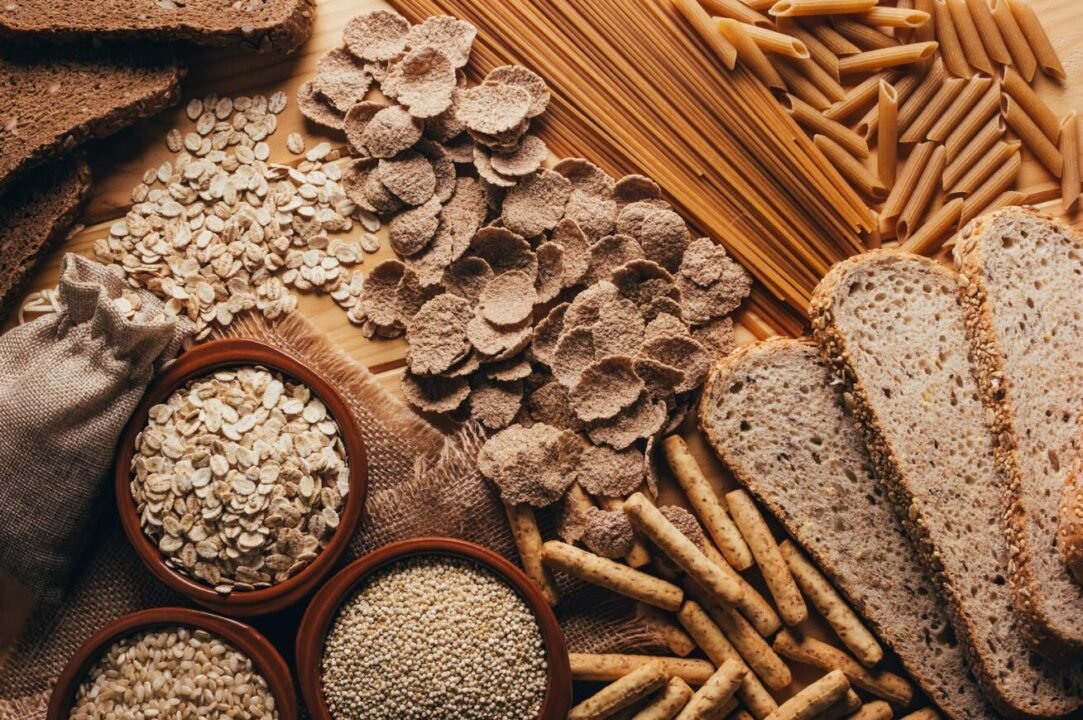Stock up your kitchen with these 10 essential pantry staples.
Grains like quinoa and brown rice provide fiber and nutrients for diverse dishes.
Canned goods offer quick meal solutions and emergency backup options. Spices elevate flavors and should be stored properly.
Oils like olive oil and vinegar add depth and enhance dishes.
Pasta is versatile and can be paired with various sauces. Legumes are protein-packed and add richness to meals. Condiments boost flavor profiles, while baking essentials and crucial flours are necessary for baked goods. Herbs, nuts, and seeds bring added texture and nutrition.
Elevate your cooking by stocking up on these essential items.
Grains
When stocking your pantry with essential kitchen items, prioritize grains for their versatility and nutritional value.
Whole grains like quinoa, brown rice, and oats are excellent staples to have on hand for meal prep. Not only are they easy to store and have a long shelf life, but they also offer a wide range of health benefits.
Whole grains are rich in fiber, vitamins, and minerals, making them a nutritious addition to any meal.

They can be used as a base for salads, side dishes, or even main courses, providing a hearty and satisfying component to your dishes. Incorporating whole grains into your diet can help improve digestion, regulate blood sugar levels, and promote overall heart health.
When planning your meals for the week, consider batch cooking grains to save time and make meal prep a breeze.
Cook a large batch of quinoa or brown rice and portion it out for easy grab-and-go lunches or quick dinners. By having whole grains readily available in your pantry, you can create delicious and nutritious meals with minimal effort.
Canned Goods
As you consider expanding your pantry staples beyond grains, a key addition to prioritize is stocking up on canned goods for convenient meal preparation and versatility.
Canned goods offer a range of benefits, including being able to whip up quick meals in a pinch and serving as emergency supplies during unforeseen circumstances.
Having a selection of canned goods on hand allows you to create meals in a fraction of the time it would take to prepare fresh ingredients. Ingredients like canned tomatoes, beans, and vegetables can be the foundation for various dishes, saving you time and effort.
Additionally, in emergencies where fresh produce may not be readily available, canned goods ensure you have essential ingredients to sustain yourself and your family.
When choosing canned goods for your pantry, opt for items with no added salt or sugar to maintain a healthier diet. Be sure to rotate your stock periodically to keep items within their expiration dates, guaranteeing you always have reliable options for quick meals and emergency situations.
Spices
To elevate your culinary creations and add depth of flavor, incorporating a variety of spices into your pantry is vital.
Spice combinations can transform a simple dish into a culinary masterpiece. Consider blends like curry powder for exotic dishes, or Italian seasoning for a taste of the Mediterranean.
Spice storage is important to maintaining the freshness and potency of your spices. Store them in a cool, dark place away from heat sources to preserve their flavor.
Organizing your spices in airtight containers or spice racks can also help you quickly locate the ones you need while keeping them fresh. Labeling your spices with the purchase date can make sure you use them before they lose their potency.
Additionally, consider grinding whole spices as needed for maximum flavor.
By investing in quality spices and proper storage, you can enhance your dishes with tantalizing aromas and rich flavors that will impress your family and friends.
Oils and Vinegars
Exploring a variety of oils and vinegars can enhance the depth and complexity of your dishes, enriching your culinary creations with unique flavors and textures.
Oils and vinegars are essential flavor enhancers in the kitchen. Olive oil, known for its versatility, is a staple for both cooking and salad dressings. Its rich taste adds depth to sautés and roasts while providing a smooth base for vinaigrettes. For a more robust flavor, consider trying extra virgin olive oil.
Additionally, vinegar plays a vital role in many dishes, serving as a key ingredient in salad dressings and marinades. Balsamic vinegar, with its sweet and tangy profile, is perfect for drizzling over salads or roasted vegetables. Meanwhile, apple cider vinegar adds a zingy touch to marinades for meats or vegetables.
Incorporating a selection of oils and vinegars into your pantry ensures you have the necessary cooking essentials to elevate your dishes and create delicious marinades that will impress your guests.
Pasta
Immerse yourself in the world of pasta, where endless shapes and flavors await to elevate your culinary creations.
Pasta is a versatile staple that can be transformed into countless delicious dishes. From creamy Alfredo to tangy marinara, pasta pairs beautifully with a variety of sauces.

When exploring pasta recipes, consider matching the shape of the pasta to the type of sauce you’re using. For example, long and thin spaghetti is perfect for olive oil-based sauces, while the nooks and crannies of penne hold creamy sauces exceptionally well.
Cooking tips for pasta include salting the water generously before cooking to enhance the flavor of the pasta itself.
Don’t forget to reserve a cup of pasta water before draining, as it can be used to adjust the consistency of your sauce if needed. Experiment with different pasta shapes—from classic spaghetti to fun shapes like bowties or shells—to keep your meals exciting and varied.
Mastering the art of pasta opens up a world of delicious possibilities in your kitchen.
Legumes
Discover the rich and nutritious world of legumes, a versatile pantry staple that can add depth and flavor to your dishes.
Protein-packed legumes aren’t only a great source of plant-based protein but also offer a wide range of essential nutrients like fiber, vitamins, and minerals. From chickpeas to black beans, lentils to kidney beans, the variety of legumes available guarantees there’s something for every palate and every dish.
Incorporating legumes into your meals is easy with versatile bean recipes.
Whether you’re making a hearty chili, a revitalizing bean salad, or a creamy hummus spread, legumes can elevate the taste and nutritional value of your cooking. They’re also economical and have a long shelf life, making them a practical addition to your kitchen pantry.
Experiment with different types of legumes to explore new flavors and textures in your dishes. With their health benefits and culinary flexibility, legumes are a must-have for any kitchen looking to enhance its repertoire of recipes.
Condiments
Condiments are versatile additions to your kitchen that can enhance the flavor profiles of your dishes.
These flavor enhancers are must-have kitchen essentials that can elevate even the simplest meals to new heights. From classic ketchup and mustard to exotic harissa and gochujang, condiments offer a wide range of tastes to experiment with.
One staple condiment is soy sauce, a savory and salty addition that works wonders in stir-fries, marinades, and dipping sauces. Another essential is mayonnaise, perfect for adding creaminess to sandwiches and salads. Mustard, with its tangy kick, can be used in dressings or to liven up a hot dog.
Don’t forget about the versatility of salsa, whether you prefer it chunky or smooth, it adds a burst of freshness to tacos, nachos, or eggs.
And for those who enjoy a bit of heat, keeping a bottle of hot sauce on hand is a must. These kitchen essentials are the finishing touch that can take your dishes from ordinary to extraordinary.
Baking Essentials
Baking essentials are fundamental tools and ingredients that are essential for creating delicious baked goods.
When it comes to achieving the perfect texture and taste in your baked treats, two key factors to take into account are dough consistency and flour alternatives.
Achieving the right dough consistency is vital for the success of your baked goods. Whether you’re making bread, cookies, or pastries, having the correct dough consistency guarantees that your final product turns out just right – not too dense or too crumbly.
Different recipes may call for varying levels of moisture in the dough, so pay close attention to achieve the desired result.
Additionally, exploring flour alternatives can open up a world of possibilities for your baking endeavors.
From almond flour to coconut flour, there are numerous options to suit different dietary preferences and needs. Experimenting with these alternatives can’t only add unique flavors to your baked goods but also cater to gluten-free or low-carb diets.
Herbs
Exploring the diverse world of herbs in your kitchen can greatly enhance the flavors and aromas of your dishes, elevating your culinary creations to new heights.
Herbs aren’t just for seasoning; they can also be used for herbal remedies and creating herb-infused oils.
Herbal remedies have been used for centuries for their medicinal properties. For example, peppermint can aid in digestion, while chamomile is known for its calming effects. Having a variety of herbs on hand allows you to experiment with different remedies and incorporate them into your daily routine.
Herb-infused oils are a fantastic way to add depth and complexity to your dishes.
Whether you’re infusing olive oil with rosemary for a savory kick or creating a chili-infused oil for a spicy touch, the opportunities are boundless. These oils can be drizzled over salads, used for dipping bread, or as a finishing touch on roasted vegetables.
Incorporating herb-infused oils into your cooking will take your dishes from ordinary to extraordinary.
Nuts and Seeds
Enhancing your culinary repertoire with a variety of nuts and seeds can bring a delightful crunch and nutritional boost to your dishes.
Nuts like almonds, walnuts, and pecans are versatile ingredients that can be used in both sweet and savory recipes.
Almonds, for example, can be ground into almond flour for baking or toasted and sprinkled over salads for added texture. Walnuts are rich in omega-3 fatty acids and add a rich, buttery flavor to dishes like pesto or oatmeal. Pecans can be caramelized and used in desserts like pecan pie or chopped and added to granola for a nutritious snack.

In addition to nuts, incorporating seeds into your pantry can elevate your meals.
Chia seeds and flaxseeds are excellent sources of omega-3s and can be sprinkled on top of yogurt or blended into smoothies. Pumpkin seeds and sunflower seeds are great for snacking or can be added to salads for extra crunch.
Consider stocking up on nut butters for a convenient spread or using seed mixes to top your morning cereal for a nutritious start to your day.
At The End
Stocking your kitchen with these 10 pantry staples will guarantee you always have the basics on hand to whip up delicious meals without running to the store last minute.
Grains, canned goods, spices, oils, pasta, condiments, baking essentials, herbs, nuts, and seeds are versatile ingredients that can be used in a variety of dishes.
Having these items in your pantry will make meal planning and cooking a breeze.
